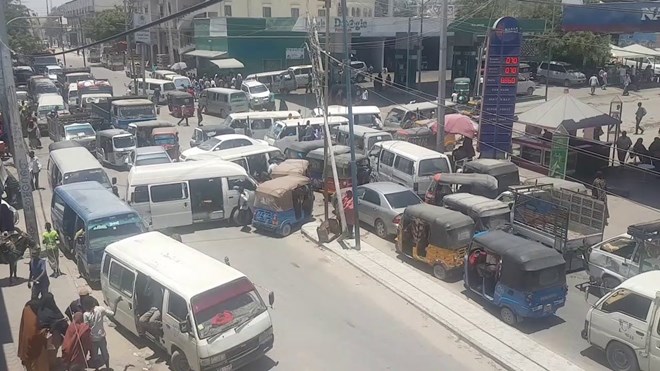Friday March 3, 2023
By Ahmed Abdulahi Kabole

A traffic jam in Mogadishu. CREDIT: Somali Public Agenda
Al-Shabaab, a terrorist group affiliated with Al-Qaeda, has been responsible for numerous attacks in Mogadishu over the years. They've targeted government officials, security forces, and civilians, using vehicles as weapons to carry out hit-and-run attacks. These attacks have caused widespread destruction, chaos, and a sense of fear and insecurity among the population.
The group's deadliest attack was the 2017 truck bombing that killed over 500 people and injured hundreds more. In January 2021, Al-Shabaab claimed responsibility for a car bombing at a busy checkpoint in Mogadishu that killed at least ten people and wounded dozens more. And in December 2019, the group targeted a busy street in Mogadishu with a car bomb, killing at least 90 people and injuring over 100.
Mogadishu has long been plagued by war, terrorism, poverty, and inadequate infrastructure, making life difficult for its residents. One of the city's biggest challenges is the lack of designated walkways, traffic planning, and marked lanes for transportation. This not only makes it difficult for people to get around safely but also makes it easier for terrorists to carry out attacks and escape undetected.
Without designated walkways and marked lanes, terrorists can blend in with regular traffic, making it harder for law enforcement agencies to identify and apprehend them. The intermingling of traffic also makes it difficult to distinguish between innocent individuals and potential attackers, leading to the risk of security forces mistakenly targeting innocent people. This can create a rift between the government and the people and damage the reputation of law enforcement agencies.
To combat the threat of terrorism and improve the safety and security of Mogadishu's residents, the government of Somalia must prioritize the development of an organized transportation system that includes designated walkways and marked lanes. This will not only help prevent terrorist attacks but also improve the overall quality of city life. Pedestrians will be able to walk freely without fear of being hit by cars, and drivers can move through the city more efficiently, reducing road congestion and improving transportation flow.
In addition to improving infrastructure, the security forces must work closely with the community to build trust and support. They must ensure their actions align with the law and serve the public's best interests. By doing so, they can create a safer and more secure society for everyone.
In conclusion, the absence of designated roads and marked lanes in Mogadishu has made the city vulnerable to terrorist attacks and has damaged the image of Somalia's interior. By taking appropriate measures to improve infrastructure and increase security measures, the government can create a safer and more secure Mogadishu that prioritizes the safety and well-being of its citizens.
-----
The author, Ahmed Abdulahi Mohamed, known as Ahmed Kaboole, is a qualified political science expert focusing on security and crisis management. He holds a degree from the Swedish Defense University in Stockholm, Sweden.